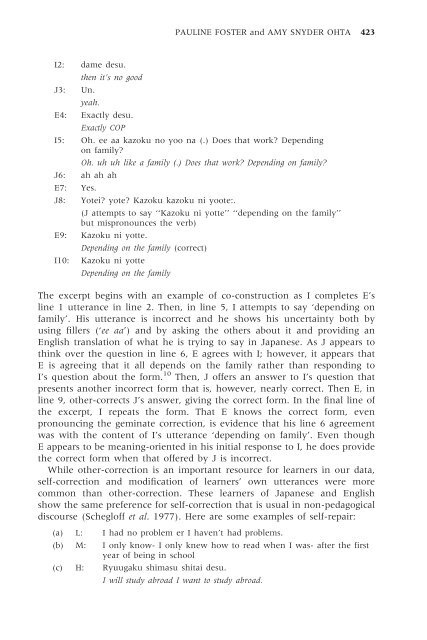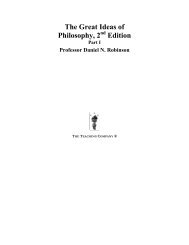Negotiation for Meaning and Peer Assistance in Second Language ...
Negotiation for Meaning and Peer Assistance in Second Language ...
Negotiation for Meaning and Peer Assistance in Second Language ...
You also want an ePaper? Increase the reach of your titles
YUMPU automatically turns print PDFs into web optimized ePapers that Google loves.
PAULINE FOSTER <strong>and</strong> AMY SNYDER OHTA 423<br />
I2: dame desu.<br />
then it’s no good<br />
J3: Un.<br />
yeah.<br />
E4: Exactly desu.<br />
Exactly COP<br />
I5: Oh. ee aa kazoku no yoo na (.) Does that work? Depend<strong>in</strong>g<br />
on family?<br />
Oh. uh uh like a family (.) Does that work? Depend<strong>in</strong>g on family?<br />
J6: ah ah ah<br />
E7: Yes.<br />
J8: Yotei? yote? Kazoku kazoku ni yoote:.<br />
(J attempts to say ‘‘Kazoku ni yotte’’ ‘‘depend<strong>in</strong>g on the family’’<br />
but mispronounces the verb)<br />
E9: Kazoku ni yotte.<br />
Depend<strong>in</strong>g on the family (correct)<br />
I10: Kazoku ni yotte<br />
Depend<strong>in</strong>g on the family<br />
The excerpt beg<strong>in</strong>s with an example of co-construction as I completes E’s<br />
l<strong>in</strong>e 1 utterance <strong>in</strong> l<strong>in</strong>e 2. Then, <strong>in</strong> l<strong>in</strong>e 5, I attempts to say ‘depend<strong>in</strong>g on<br />
family’. His utterance is <strong>in</strong>correct <strong>and</strong> he shows his uncerta<strong>in</strong>ty both by<br />
us<strong>in</strong>g fillers (‘ee aa’) <strong>and</strong> by ask<strong>in</strong>g the others about it <strong>and</strong> provid<strong>in</strong>g an<br />
English translation of what he is try<strong>in</strong>g to say <strong>in</strong> Japanese. As J appears to<br />
th<strong>in</strong>k over the question <strong>in</strong> l<strong>in</strong>e 6, E agrees with I; however, it appears that<br />
E is agree<strong>in</strong>g that it all depends on the family rather than respond<strong>in</strong>g to<br />
I’s question about the <strong>for</strong>m. 10 Then, J offers an answer to I’s question that<br />
presents another <strong>in</strong>correct <strong>for</strong>m that is, however, nearly correct. Then E, <strong>in</strong><br />
l<strong>in</strong>e 9, other-corrects J’s answer, giv<strong>in</strong>g the correct <strong>for</strong>m. In the f<strong>in</strong>al l<strong>in</strong>e of<br />
the excerpt, I repeats the <strong>for</strong>m. That E knows the correct <strong>for</strong>m, even<br />
pronounc<strong>in</strong>g the gem<strong>in</strong>ate correction, is evidence that his l<strong>in</strong>e 6 agreement<br />
was with the content of I’s utterance ‘depend<strong>in</strong>g on family’. Even though<br />
E appears to be mean<strong>in</strong>g-oriented <strong>in</strong> his <strong>in</strong>itial response to I, he does provide<br />
the correct <strong>for</strong>m when that offered by J is <strong>in</strong>correct.<br />
While other-correction is an important resource <strong>for</strong> learners <strong>in</strong> our data,<br />
self-correction <strong>and</strong> modification of learners’ own utterances were more<br />
common than other-correction. These learners of Japanese <strong>and</strong> English<br />
show the same preference <strong>for</strong> self-correction that is usual <strong>in</strong> non-pedagogical<br />
discourse (Schegloff et al. 1977). Here are some examples of self-repair:<br />
(a) L: I had no problem er I haven’t had problems.<br />
(b) M: I only know- I only knew how to read when I was- after the first<br />
year of be<strong>in</strong>g <strong>in</strong> school<br />
(c) H: Ryuugaku shimasu shitai desu.<br />
I will study abroad I want to study abroad.














